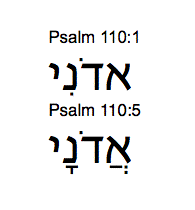The other day, there was a comment posted onto it by Adam Pastor of ADONI MESSIAH blog.
I always welcome thoughtful posts and his was certainly in that category.
He makes the point that Psalm 110:1 which says, "The LORD (YHWH) says to my Lord (adoni) ... " is mis-translated.
He said that the Hebrew word adoni should always be translated lord (non-divine) versus adonai which should always be translated Lord (divine).
Following that logic, he then points out that since Jesus used Psalm 110 to describe himself then he must be lord (non-divine). UPDATE: A Jewish rabbi makes essentially the same point in this item. Additionally, certain schools of thought in the Unitarian stream would agree with this analysis.
What do you think?
 First, I'm am molecular biologist not a Hebrew scholar!
First, I'm am molecular biologist not a Hebrew scholar!However, using what skills I have as a web surfer, I went ahead to check out this idea.
Indeed, I looked up the Hebrew text for Psalm 110. I looked for the Hebrew words for L/l(ord) used in verses 1 and 5 (see image to left).
Indeed, if you transliterate the consonent letters and vowel points of the Hebrew letters right-to-left, you get alef-dalet(o)-nun(i)-yod for verse one. For verse five you get, alef-dalet(o)-nun(a)-yod. The difference is the vowel point under the NUN: a dot versus a T!
According to Jewfaq.org, the vowel points in written Hebrew was added to the text as an aid to pronunciation. Excerpt:
Like most early Semitic alphabetic writing systems, the alefbet has no vowels. People who are fluent in the language do not need vowels to read Hebrew, and most things written in Hebrew in Israel are written without vowels.The vowels existed in spoken Hebrew. However, one might wonder if the adoni/adonai distinction always existed in the spoken form?
However, as Hebrew literacy declined, particularly after the Romans expelled the Jews from Israel, the rabbis recognized the need for aids to pronunciation, so they developed a system of dots and dashes called nikkud (points). These dots and dashes are written above, below or inside the letter, in ways that do not alter the spacing of the line. Text containing these markings is referred to as "pointed" text.
Is it possible that based on context, Jews knew whether it should be adoni/adonai and that guided the vowel points later on? I would guess that 99.9% of the time, it is apparent from context whether the reference is to the divine or not?
This is a theological debate: when we think of the Bible as inspired, does this include this part (vowel points) of the preservation and transmission of the Scriptures?
I repeat, I am a molecular biologist not a theologian!
In any case, in Psalm 110 both forms of L/l(ord) are seen in the Hebrew!
Are these two usages of L/o(ord) in reference to the divine?
In the course of human language, words have meanings in of themselves but often the meaning is determined in context.
For example, if I'm sitting across the dinner table across a beautiful woman and she says, "Shall we split?"
What does she mean?
(1) Let's leave the restaurant.
(2) I'll pay half the bill and you pay half the bill.
(3) She is dumping me.
Context determines the meaning.
Another example, let's say I say, [put your favorite actress here] is a goddess!
I suppose it is theoretically possible that someone might think, this blogger thinks Rachel McAdams is divine?
Most likely, it will be understood that in this blogger's opinion, she is outrageously gorgeous?
However, let us return to more spiritual matters of Psalm 110.
The key question is this: is the lord of verse one the same as the Lord of verse 5?
Verse one:
The LORD says to my lord:
"Sit at my right hand
until I make your enemies
a footstool for your feet."
Verse five:
The Lord is at your right hand;
he will crush kings on the day of his wrath.
Two possible interpretations:
(1) The Lord of verse five is indeed the same as the lord of verse one. In which case adoni and adonai are used interchangeably in this passage.
(2) The Lord of verse five is the LORD of verse one. As such, the LORD of verse one switches place with the lord of verse one such that Lord of verse five is now at the right hand of the lord of verse one. Got it?
If all I had was Psalm 110 for context, I don't know which one I would pick.
If my only context is the strict monotheism of Jewish thought, I think that would make option two the only option though it would make the lord of verse one passive throughout.
However, if we factor in Jesus into the context of interpretation, his citation of Psalm 110 for himself to establish his authority makes option one intriguing. In this scenario, the power of the LORD is on display in verse one to four and the power of the L/l(lord) is on display in verses five to seven. Of course, this view means forgoing the strict Jewish monotheism and adopting the trinitarian monotheism of Christianity which in the eyes of Judaism (and Islam for that matter) does violence to their concept of monotheism.
Calling any Hebrew scholars and theologians within a click of this blog ... what do you think?
No comments:
Post a Comment